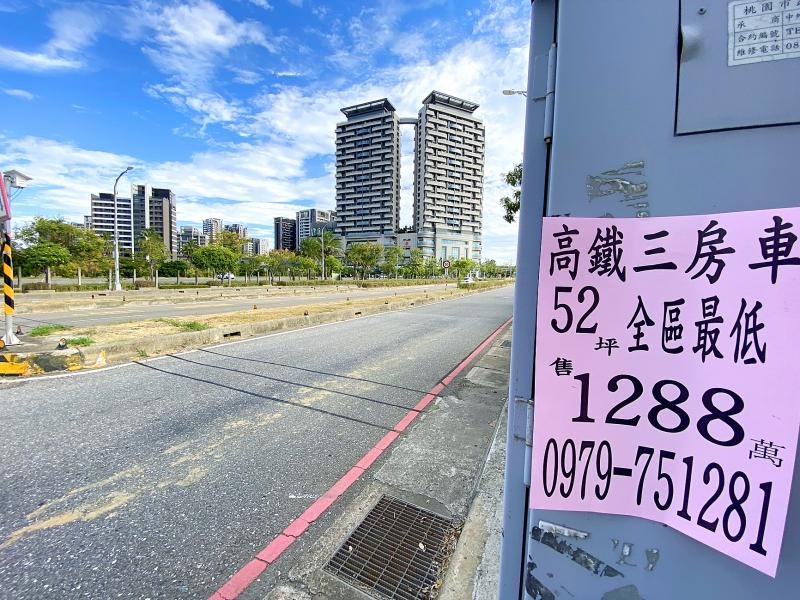Nearly 40 percent of Taiwanese expect housing prices to pick up this quarter and 10 percent predict a decline, while many expressed concern over inflation, Chinatrust Real Estate Co (中信房屋) said in a survey released yesterday.
Thirty-nine percent of respondents said that housing prices would rise in the next few months, Chinatrust Real Estate said, citing internal data.
Although the Chung-Hua Institution for Economic Research (中華經濟研究院) on Wednesday raised its forecast for Taiwan’s GDP growth this year to 5.84 percent from 5.16 percent, 42 percent of respondents said that the economy weakened last quarter from three months earlier, the real-estate broker said.

Photo: Hsu Yi-ping, Taipei Times
Restaurants and small and medium-sized retailers exited the market to stop losses after business failed to return to normal amid a level 2 COVID-19 alert, it said.
At the same time, sectors are complaining about escalating operating costs as prices for oil products, raw materials and commodities soar, it said.
Developers and builders have indicated chances are slim of price concessions in light of more expensive steel, wood, glass and other building materials, despite the government’s selective credit controls and unfavorable property tax terms, it said.
Construction might focus on apartments with a lower barrier to entry on cheaper land for the time being rather than more expensive projects, as prospective buyers might hesitate, Chinatrust Real Estate said.
For existing homes, sellers and buyers should iron out their pricing differences in a timely fashion to cope with inflation, which would eat away at wealth, it said.
About 75 percent of respondents said that things are much more expensive today than this time last year, including 30 percent who said that prices are “very expensive,” it said, adding that 45 percent said that things are “less expensive.”
Given that, respondents believe home prices would hold steady in the near future, it said.
People are willing to cut spending on clothing and recreation, if necessary, to cope with inflation, as they are not necessary items, the survey said.
Food and housing rank high on the list of concerns, as both are essential to maintain a decent life, it said.

UNCERTAINTY: Innolux activated a stringent supply chain management mechanism, as it did during the COVID-19 pandemic, to ensure optimal inventory levels for customers Flat-panel display makers AUO Corp (友達) and Innolux Corp (群創) yesterday said that about 12 to 20 percent of their display business is at risk of potential US tariffs and that they would relocate production or shipment destinations to mitigate the levies’ effects. US tariffs would have a direct impact of US$200 million on AUO’s revenue, company chairman Paul Peng (彭雙浪) told reporters on the sidelines of the Touch Taiwan trade show in Taipei yesterday. That would make up about 12 percent of the company’s overall revenue. To cope with the tariff uncertainty, AUO plans to allocate its production to manufacturing facilities in

TAKING STOCK: A Taiwanese cookware firm in Vietnam urged customers to assess inventory or place orders early so shipments can reach the US while tariffs are paused Taiwanese businesses in Vietnam are exploring alternatives after the White House imposed a 46 percent import duty on Vietnamese goods, following US President Donald Trump’s announcement of “reciprocal” tariffs on the US’ trading partners. Lo Shih-liang (羅世良), chairman of Brico Industry Co (裕茂工業), a Taiwanese company that manufactures cast iron cookware and stove components in Vietnam, said that more than 40 percent of his business was tied to the US market, describing the constant US policy shifts as an emotional roller coaster. “I work during the day and stay up all night watching the news. I’ve been following US news until 3am

Taiwan will prioritize the development of silicon photonics by taking advantage of its strength in the semiconductor industry to build another shield to protect the local economy, National Development Council (NDC) Minister Paul Liu (劉鏡清) said yesterday. Speaking at a meeting of the legislature’s Economics Committee, Liu said Taiwan already has the artificial intelligence (AI) industry as a shield, after the semiconductor industry, to safeguard the country, and is looking at new unique fields to build more economic shields. While Taiwan will further strengthen its existing shields, over the longer term, the country is determined to focus on such potential segments as

COLLABORATION: Given Taiwan’s key position in global supply chains, the US firm is discussing strategies with local partners and clients to deal with global uncertainties Advanced Micro Devices Inc (AMD) yesterday said it is meeting with local ecosystem partners, including Taiwan Semiconductor Manufacturing Co (TSMC, 台積電), to discuss strategies, including long-term manufacturing, to navigate uncertainties such as US tariffs, as Taiwan occupies an important position in global supply chains. AMD chief executive officer Lisa Su (蘇姿丰) told reporters that Taiwan is an important part of the chip designer’s ecosystem and she is discussing with partners and customers in Taiwan to forge strong collaborations on different areas during this critical period. AMD has just become the first artificial-intelligence (AI) server chip customer of TSMC to utilize its advanced